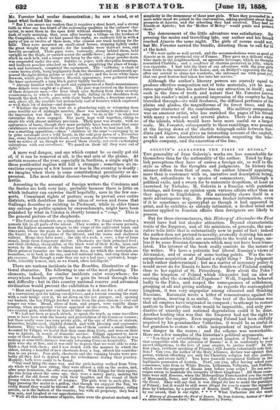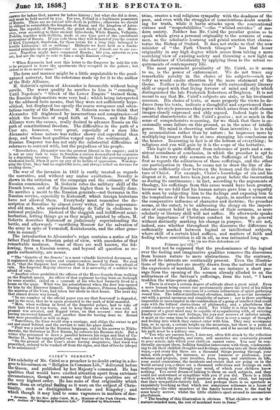GOLOTIN'S ALEXANDER THE FIRST OF RUSSIA. * TICE generality of Ivan
Golovin's works are less remarkable for themselves than for the nationality of the author. Tried by Eng- lish perceptions they have of course a foreign air, as well in the style as often in the thoughts and judgments. In history the manner differs from that of ours, the author himself appearing more than is customary with us, narrative and description being, in fact, subordinate to a species of commentary. Although a political exile, and a sworn foe to autocratic despotism, at least as exercised by Nicholas, M. Golovin is a Russian with patriotic leanings, and forms an opinion upon various affairs other than as they appear to Englishmen. His nationality shows itself in a more advantageous way. He possesses fresher information, even if it be sometimes as apocryphal as though it had appeared in print, and he exhibits, as already intimated, a fresher mind and manner applied to Russian affairs than foreigners are likely to possess. But for these circumstances, this History of Alexander the First would have had but slender attraction. Beyond characteristic traits of the Emperor, and of his ministers, or generals, the nar- rative tells little that is substantially new in point of fact : indeed the author does not pretend to novelty, avowedly deriving his mat- ter from authorities which are accessible to the world at large, un- less it be some Russian documents which may not have been trans- lated. The interest of the book really consists in the nature of the writer. We have a patriotic but liberal Russian's views of Alexander, and of course of some testing points. Was the un- scrupulous acquisition of Finland a right thing ? The judgment is left rather undetermined ; but as a matter of necessary policy it would never do for Russia to have the frontiers of Finland coming close to her capital of St. Petersburg. How about the Poles ? and the kingdom of Poland which Alexander had an idea of erecting after the downfall of Napoleon ? Well, Napoleon behaved badly to the Poles, and reaped the consequences of selfishness, grasping at all and giving nothing. As regards the contemplated kingdom, it was very unpopular among educated and thinking Russians. Karamzin wrote a letter of remonstrance against the very notion, treating it as sinful. One text of the historian was that all empires have originated in conquest ; to attempt to restore matters to their pristine state would be impossible, and only pro- ductive of anarchy and national degradation could it be done. Another leading idea was that the Emperor had not the right to dismember the empire. Even supposing Poland had been sinfully acquired by his grandmother Catherine, it would be as sinful in her grandson to restore it : while independent of injustice there was danger in the course ; and the scheme was unworkable.
Here are a few samples of the historian's political arguments.
" You think of reestablishing the ancient kingdom of Poland ; but is that compatible with the salvation of Russia ? is it in conformity to your sacred obligations, to, the love of your empire, to justice itself? In the first place, (without speaking of Prussia,) will Austria voluntarily cede Gal- licia Can you, the author of the Holy Alliance, declare war against that power, without offending not only the Christian religion but also justice, treaties, and sworn faith ? You have yourself recognized Gallicia as the legitimate possession of Austria. Next, can you after having asked your conscience, take from us White Russia, Lithuania, Volhynia, and Podolia, which were the property of Russia long before your reign ? Do not sove- reigns swear to maintain the integrity of their kingdoms ? All those coun- tries were still _Russian, -when the Metropolitan Plato handed you the crown of Monomakh, Peter, and Catherine, that Catherine whom yourself called the Great. They will say that it was illegal for her to make the partition of Poland ; but it would be still more illegal for you to repair the unustace done by Catherine, by a partition of Russia itself. We conquered Poland by our sword, that is our right. * * * * What Catherine did she must • History of Alexander the First of Russia. By Ivan Golovin, Authoi of "Bur sia under Nicholas the First," &c. Published by Newby. answer for before God, answer for before history ; but what she did is done, and must be held sacred by you. For you, Poland is a legitimate possession of Russia. There are no ancient title-deeds in politics ; otherwise we should be obliged to reestablish the kingdom of Kasan and the kingdom of Astra- khan, the republic of Novgorod, the grand duchy of Riazan, &c. More- over, even according to those ancient title-deeds, 'White Russia, Volhynia, Podolia, together with Gallicia, made at one time part of the constituent possessions of Russia. If you cede them they will demand of you the cession of Kief, Czernigof, Smolensk, for those towns for a long time belonged to hostile Lithuania : all or nothing ! Hitherto we have held as a funda- mental principle in our politics—not an inch to our friends nor to our ene- mies. Napoleon might have conquered Russia ; but you, autocrat as you are, had not • the right to cede to him a single Russian cottage.' him
When Karamzin had sent this letter to the Emperor he told his wife to be prepared to leave the apartments they occupied in the palace ; but orders to do so never came."
The form and manner might be a little unpalatable to the good- natured autocrat, but the substance made up for it to the author of the Holy Alliance.
M. Golovin's opinion of Alexander is favourable without being servile. The worst quality he ascribes to him is " cunning.' Until Napoleon's " Greek of the Lower Empire " trained them, the Russian diplomatists were very bad ; which being interpreted by the adduced facts means, that they were not sufficiently hypo- critical, but displayed too openly the coarse arrogance and osten- tatious vanity of the Muscovite. M. Golovin seems to think that Alexander till frightened by insurrections and conspiracies—of which the breaches of regal faith at Vienna, and the Holy Alliance were the causes, really desired to advance Russia on the path of constitutional freedom. The difficulties in the path of a Czar are, however, very great, especially of a man like Alexander whose nature was rather showy and superficial than deep, and whose,best qualities verged upon the sentimental. A Russian Emperor too has not only the substantial difficulties of reformers to contend with, but the prejudices of his people.
"Nevertheless, Alexander was the greatest liberal in the empire ; and it is not an easy task to raise to freedom a nation demoralized for centuries by a degrading tyranny. The Russians thought that the governing power weakened itself, when it gave up any of its habits of oppression. Worship- ping the Czar, they had no regard for laws, and always relied on favours for evading them."
The war of the invasion in 1812 is curtly treated as regards the narrative, and without any undue exaltation. Novelty is shown in the criticism of the campaign and the estimate of the Russian commanders. M. Golovin rates the military skill of the French lower, and of the Russians higher than is usually done. He ascribes a merit to the Russian_ generals—not Germans in the Russian service, especially to Kutousoff, which foreign historians have not allowed them. Everybody tanst remember the de- scription at Borodino by almost every writer, of this superannu- ated old man, who superseded Barclay de Tony in obedience to national prejudice. Instead of the sluggish and indifferent semi- barbarian, letting things go as they might, painted by others, M. Golovin describes Kutousoff asjudiciously superintending the battle, and afterwards " sacrificing Moscow for the salvation of the army in spite of Yermaloff, Kantakouzin, and the other gene- rals in council."
The introduction to Alexander's reign contains a notice of his father Paul from a Russian point of view, with anecdotes of that remarkable madman. Some of these are well known, the fol- lowing, from a Russian source, and beyond all question as re- gards authenticity, are newer.
" The Gazette of the Senate' is a most valuable historical document, as it registered the daily orders and counter-orders issued by Paul. We read in it, 'that the Emperor had remarked that Prince Galitzin was afraid of rain. His Imperial Majesty observes that it is unworthy of a soldier to be afraid of rain.'
"Another ukase prohibited the officers of the Horse Guards from walking on the English quays. An officer of that regiment having been on furlough for some months, called on a comrade of his who had formerly lived in a house on the quay. What was his astonishment when the door was opened for him by the Emperor himself. During his absence, Princess Lapoukhin, the mistress of the Czar, had taken her abode in that house. The next day that absurd decree was issued.
" In one number of the official paper you see that Souvoroff is degraded, and in the next, that he is again promoted to the rank of field-marshal. "Men, when walking in front of the Imperial palace, had to take off their hats when it was warm, and to keep them on when it was cold. A peasant was arrested, and flogged twice, on that account : once for not having uncovered himself, and another time for having done so. Round hats were proscribed as well as dogs. " Sometimes, the Czar would stop a carriage, and oblige the owner to get out and stand behind, and the servant to take his place inside. "Paul was a purist in the Russian language, and in his answer to Nikla- shewski, the Governor in New Russia, he corrects his Russian style. But a writer who presumed to draw a parallel between his reign and that of Ca- therine II., had his tongue pulled out, and was exiled to the Aleout Islands.
"On the ground of the Czar's alone having magazines, that word was proscribed, ordered to be washed off from the signs, and that of Mirka (shops) to be substituted."



























 Previous page
Previous page